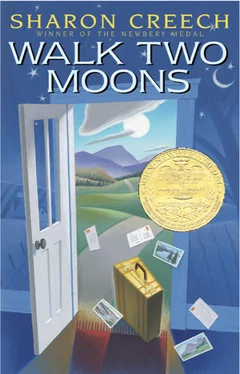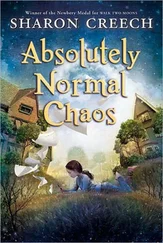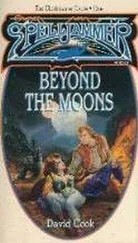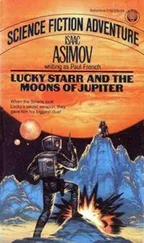If he went into town to buy supplies for the farm, he would come back with something for my mother and something for me. They were small things—a cotton scarf, a book, a glass paperweight—but whatever he brought, it was exactly what you would have picked out for yourself.
I had never seen him angry. “Sometimes I don’t think you’re human,” my mother told him. It was the sort of thing she said just before she left, and it bothered me, because it seemed as if she wanted him to be meaner, less good.
Two days before she left, when I first heard her raise the subject of leaving, she said, “I feel so rotten in comparison.”
“Sugar, you’re not rotten,” he said.
“See?” she said. “See? Why couldn’t you at least believe I am rotten?”
“Because you’re not,” he said.
She said she had to leave in order to clear her head, and to clear her heart of all the bad things. She needed to learn about what she was.
“You can do that here, Sugar,” he said.
“I need to do it on my own,” she said. “I can’t think. All I see here is what I am not. I am not brave. I am not good. And I wish someone would call me by my real name. My name isn’t Sugar. It’s Chanhassen.”
She had not been well. She had had some terrible shocks, it is true, but I did not understand why she could not get better with us. I begged her to take me with her, but she said I could not miss school and my father needed me and besides, she had to go alone. She had to.
I thought she might change her mind, or at least tell me when she was leaving. But she did neither of those things. She left me a letter which explained that if she said good-bye, it would be too terribly painful and it would sound too permanent. She wanted me to know that she would think of me every minute and that she would be back before the tulips bloomed.
But, of course, she was not back before the tulips bloomed.
It nearly killed my father after she left, I know it, but he continued on doing everything just as before, whistling and humming and finding little gifts for people. He kept bringing home gifts for my mother and stacking them in a pile in their bedroom.
On the day after he found out she wasn’t returning, he flew to Lewiston, Idaho, and when he came back, he spent three days chipping away at the fireplace hidden behind the plaster wall. Some of the cement grouting between the bricks had to be replaced, and he wrote her name in the new cement. He wrote Chanhassen , not Sugar .
Three weeks later he put the farm up for sale. By this time he was receiving letters from Mrs. Cadaver, and I knew that he was answering her letters. Then he drove up to see Mrs. Cadaver while I stayed with Gram and Gramps. When he came back, he said we were moving to Euclid. Mrs. Cadaver had helped him find a job.
I didn’t even wonder how he had met Mrs. Cadaver or how long he had known her. I ignored her whole existence. Besides, I was too busy throwing the most colossal temper tantrums. I refused to move. I would not leave our farm, our maple tree, our swimming hole, our pigs, our chickens, our hayloft. I would not leave the place that belonged to me. I would not leave the place to which, I was convinced, my mother might return.
At first my father did not argue with me. He let me behave like a wild boar. At last, he took down the For Sale sign and put up a For Rent sign. He said he would rent out the farm, hire someone to care for the animals and the crops, and rent a house for us in Euclid. The farm would still belong to us and one day we could return to it. “But for now,” he said, “we have to leave because your mother is haunting me day and night. She’s in the fields, the air, the barn, the walls, the trees.” He said we were making this move to learn about bravery and courage. That sounded awfully familiar.
In the end, I think I merely ran out of steam. I stopped throwing tantrums. I didn’t help pack, but when the time came, I climbed in the car and joined my father for our move to Euclid. I did not feel brave, and I did not feel courageous.
When I told my story of Phoebe to Gram and Gramps, I mentioned none of this. They knew it already. They knew my father was a good man, they knew I did not want to leave the farm, they knew my father felt we had to leave. They also knew that my father had tried, many times, to explain to me about Margaret, but that I wouldn’t hear it.
On that long day that my father and I left the farm behind and drove to Euclid, I wished that my father was not such a good man, so there would be someone to blame for my mother’s leaving. I didn’t want to blame her. She was my mother, and she was part of me.
Gram said, “Where did we leave off with Peeby? What was happening?”
“What’s the matter, gooseberry?” Gramps said. “Did that snake bite your brains?”
“No,” she said. “It did not bite my brains. I was just trying to refresh my memory.”
“Let’s see,” Gramps said, “didn’t Peeby want you to tell your daddy about Mrs. Cadaver and Mr. Birkway hacking up her husband?”
Yes, that is what Phoebe wanted, and it is what I tried to do. One Sunday, when my father was looking through the photo albums, I asked him if he knew much about Mrs. Cadaver. He looked up quickly. “You’re ready to talk about Margaret?” he said.
“Well—there were a few things I wanted to mention—”
“I’ve been wanting to explain—” he said.
I plunged on. I didn’t want him to explain. I wanted to warn him. “Phoebe and I saw her slashing and hacking away at the bushes in her backyard.”
“Is there something wrong with that?” he asked.
I tried another approach. “Her voice is like dead leaves blowing around, and her hair is spooky.”
“I see,” he said.
“And there is a man who visits her—”
“Sal, that sounds like spying.”
“And I don’t think we should go over there anymore.”
Dad took off his glasses and rubbed them on his shirt for about five minutes. Then he said, “Sal, you’re trying to catch fish in the air. Your mother is not coming back.”
It looked like I was merely jealous of Mrs. Cadaver. There in the calm light of my father, all those things that Phoebe had said about Mrs. Cadaver seemed foolish.
“I’d like to explain about her,” my father said.
“Oh, never mind. Just forget I mentioned her. I don’t need any explanations.”
Later, when I was doing my homework, I found myself doodling in the margin of my English book. I had drawn a figure of a woman with wild hair and evil eyes and a rope around her neck. I drew a tree, fastened the rope to it, and hung her.
The next day at school, I studied Mr. Birkway as he leaped and cavorted about the classroom. If he was a murderer, he certainly was a lively one. I had always pictured murderers as being mopey and sullen. I hoped Mr. Birkway was in love with Margaret Cadaver and would marry her and take her away so that my father and I could go back to Bybanks.
What I found most surprising about Mr. Birkway was that he increasingly reminded me of my mother—or at least of my mother before the sadness set in. There was a liveliness to both Mr. Birkway and my mother, and an excitement—a passion—for words and for stories.
That day, as Mr. Birkway talked about Greek mythology, I started daydreaming about my mother, who loved books almost as much as she loved all her outdoor treasures. She liked to carry little books in her pocket and sometimes when we were out in the fields, she would flop down in the grass and start reading aloud.
My mother especially liked Indian stories. She knew about thunder gods, earth-makers, wise crows, sly coyotes, and shadow souls. Her favorite stories were those about people who came back, after death, as a bird or a river or a horse. She even knew one story about an old warrior who came back as a potato.
Читать дальше












